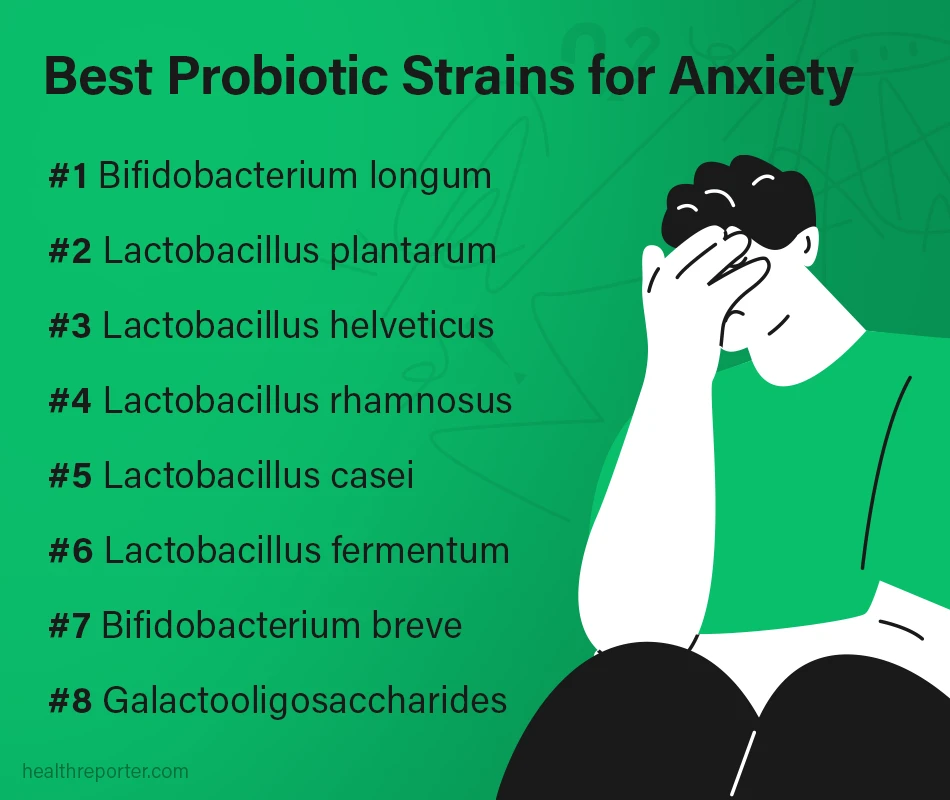Best Probiotics for Anxiety: How to Choose the Right One
Research shows that probiotics can influence your mood and have a positive effect on anxiety. But with so many strains and brands on the market, which ones are the best for anxiety relief?

People take probiotic supplements for their health and wellness benefits ranging from managing digestive issues such as irritable bowel syndrome to maintaining vaginal health.
Another benefit of maintaining gut health is improved mental health. The gut-brain axis, or the brain-gut connection, is the topic of many research studies investigating which strains of good bacteria impact mood health and how they benefit the brain.
Continue reading as we delve into the research to find out which probiotics are backed by scientific evidence and can really improve your mood and alleviate anxiety.
The Gut-Brain Connection
Your brain and your gut are constantly communicating with each other, so there’s a reason you may feel nauseous, lose your appetite, or have an upset stomach when you feel stressed, depressed, or anxious.
It’s called the gut-brain connection or the gut-brain axis. It’s a complex bidirectional communication system that connects the gastrointestinal system with the central nervous system.
The key components of the gut-brain axis include the enteric nervous system (in the gut), vagus nerve, and gut microbiome, as well as various signaling molecules, including neurotransmitters, hormones, and immune system messengers.
As a result, the effects of poor gut health and an imbalance in gut bacteria extend beyond physical well-being. A growing body of evidence suggests a possible link to mental health issues, including depression, anxiety, and conditions such as Alzheimer’s disease.
Can Probiotics Really Improve Your Mental Health?
Yes, probiotics can help improve your mental health. Although most research to date has used animal models to study the effects of probiotics on mood health, those that have studied human participants suggest promising results.
Studies have shown that manipulating the gut microbiome can have an impact on mental health conditions, including major depressive disorder, schizophrenia, and bipolar disorder via the gut-brain connection.
Since depression and anxiety frequently occur simultaneously, research suggests that the same mechanisms are responsible for the improvement in symptoms when the gut microbiota balance is addressed with probiotic supplements.
Although more research is required to answer all of the questions about how the gut-brain axis works, probiotic foods and specific probiotic bacteria may be beneficial for mental health.
Scientists believe that beneficial gut bacteria can improve mental health disorders by doing the following:
- Reduced brain inflammation. Poor gut health can stimulate the immune system, triggering an inflammatory response in the central nervous system, which is thought to be a cause of depression and anxiety.
- Improved leaky gut. Probiotics help maintain the integrity of the intestinal lining, which helps ensure that only beneficial nutrients enter the bloodstream. When larger particles enter the body, an immune response is triggered, leading to inflammation, which can be associated with symptoms of anxiety and depression.
- Regulation of neurotransmitters. Probiotics for anxiety may be beneficial because they are responsible for the production of a large percentage of neurotransmitters, including serotonin, dopamine, noradrenaline, and gamma-aminobutyric acid (GABA).
- Stimulation of the vagus nerve. It is believed that the vagus nerve is the main pathway of communication between the gut and the brain and a healthy gastrointestinal tract with a flourishing colony of beneficial bacteria facilitates a better gut-brain connection.
- Stress response control. One of the ways chronic stress influences your mental health is by altering the composition of the gut microbiome, resulting in an increase in the stress hormone cortisol.
- Altered gene expression. Butyrate-producing probiotic bacteria such as Lactobacillus plantarum have been shown to increase levels of brain-derived neurotrophic factor (BDNF), an important biochemical for regulating neurotransmitters.
Best Probiotic Strains for Anxiety

The health-promoting properties of probiotics are an exciting, relatively new field of research. To date, the benefits of probiotic supplements for treating digestive issues such as irritable bowel syndrome and supporting women’s health are backed by reputable research.
However, much more research is needed on probiotics for anxiety and other mental health issues, especially in humans.
In general, results of studies examining the impact of the gut microbiome on the gut-brain axis and the impact on anxiety and mental health are mixed. The probiotic bacteria listed below have been shown to improve mental health in some studies.
#1 Bifidobacterium longum
Most scientific studies on the impact of Bifidobacterium longum have been done on animals. They have shown that mice who are given the probiotic for a period of time show reduced stress and anxiety.
Recently, studies in humans have produced similar results. For example, the stress response and self-reported levels of anxiety of a group of healthy volunteers were assessed before being given a placebo or a Bifidobacterium longum supplement.
The researchers found that when the study participants were given the probiotic, they experienced a reduced stress response and reported lower levels of anxiety.
#2 Lactobacillus plantarum
Researchers conducted a randomized, double-blind, placebo-controlled study to examine the impact of Lactobacillus plantarum on levels of stress and anxiety in stressed adults. The results showed that the probiotic taken for 12 weeks could improve anxiety.
A follow-up study by the same researchers confirmed the gut-brain relationship and demonstrated that stress and anxiety are related to an imbalance in the gut microbiome. They suggested that restoring the balance with probiotics may improve mental health.
#3 Lactobacillus helveticus
Lactobacillus helveticus has been shown to have a positive impact on the gut-brain axis of mice. A research paper showed improved mood after mice consumed food enriched with the probiotic bacteria.
In humans, research suggests that Lactobacillus helveticus, in combination with Bifidobacterium longum, improves gut health and stress-related mental health conditions. However, the level of stress you experience may have an impact on the effectiveness of the treatment with these probiotic strains, necessitating further research.
#4 Lactobacillus rhamnosus
In a randomized controlled trial that examined the effect of Lactobacillus rhamnosus on the stress response of healthy adults during public speaking, the probiotic strain was found to reduce gut permeability and feelings of stress and anxiety.
In animal studies, Lactobacillus rhamnosus has been demonstrated to increase GABA levels in the central nervous system via the gut-brain connection, helping to improve anxiety and depression symptoms.
#5 Lactobacillus casei
The probiotic strain, Lactobacillus casei, has been shown to be beneficial for improving emotional well-being in the elderly. It may also reduce anxiety in people with chronic fatigue syndrome.
A double-blind, placebo-controlled, parallel-group study examining the effect of a Lactobacillus casei-enriched milk drink on the stress response in fourth-year medical students found that this probiotic strain significantly lowered cortisol levels and effectively reduced anxiety.
#6 Lactobacillus fermentum
A less commonly researched species, Lactobacillus fermentum offers several health benefits to humans, including boosting the immune system, preventing gastrointestinal tract and upper respiratory tract infections, and lowering blood cholesterol levels.
Antibiotics may cause mental health issues such as depression and anxiety. A study on rats showed that supplementing with Lactobacillus fermentum not only improves gut health after antibiotic treatment but also reduces symptoms of depression and anxiety.
#7 Bifidobacterium breve
In an animal study, Bifidobacterium breve was given to mice to determine its effect on chronic stress-induced depression and anxiety. The researchers found that treatment with the probiotic significantly reduced the symptoms of both mental health issues.
Similarly, in a study of people with schizophrenia, supplementation with Bifidobacterium breve was found to be beneficial in relieving symptoms of depression and anxiety.
#8 Galactooligosaccharides
Prebiotics are equally essential as probiotics in promoting both gut and mental health. They provide fuel for the beneficial bacteria in the gut, allowing them to flourish and colonize the digestive tract.
Therefore, supplementing with fibers such as galactooligosaccharides (GOS) has also been proven to be beneficial for mental health.
In a study that explored the anti-anxiety effects of a GOS supplement in healthy females, it was found to increase the number of friendly bacteria in the gut and reduce anxiety symptoms.
Best Probiotic Supplements for Anxiety
Many probiotic supplements are formulated to offer specific health benefits, including constipation relief, women’s health, and weight loss. You can also choose supplements that are vegan-friendly.
Below, we’ve compiled a list of the best probiotics for anxiety. Each of these options includes probiotic strains with proven benefits for mental health and reducing anxiety symptoms.




Bifidobacterium lactis
Bifidobacterium longum
Bifidobacterium breve
Lactobacillus casei
Lactobacillus paracasei
Lactobacillus rhamnosus
Lactobacillus plantarum
Lactobacillus fermentum
Bifidobacterium longum
Bifidobacterium bifidum
Bifidobacterium breve
Lactobacillus acidophilus
Bifidobacterium lactis
Lactobacillus plantarum
Lactobacillus paracasei
Lactobacillus rhamnosus
Bifidobacterium lactis BL818
Lactobacillus acidophilus (SD-5221)
Lactobacillus paracasei (SD-5218)
Bifidobacterium lactis (SD-5220)
Price
Initial digestive discomfort, including gas, bloating, and abdominal pain
Inconsistent results May trigger an allergic reaction
Formulated specifically for men
Inconsistent results
Only available online
More expensive than other probiotic supplements
Initial digestive discomfort, including gas, nausea, and diarrhea
May interfere with prescription medications
Inconsistent results
May be ineffective for some people
Price
May not work for everyone
A Word From Our MD
Although certain probiotic strains are showing promising results, probiotics for anxiety are still a new field of scientific study.
As such, if you suffer from anxiety or any other mental health condition, it is critical for you to continue with your current treatment. Mental health apps also offer affordable and accessible support for depression and anxiety.
Probiotic supplements are generally safe, so you could start taking one if your doctor agrees that it is a good option for you. Otherwise, you could increase your intake of probiotic foods.
Fermented foods such as yogurt, sauerkraut, tempeh, miso, and pickles contain beneficial bacteria that promote healthy gut flora. They may help to treat anxiety by reducing brain inflammation, reducing stress hormone levels, and modulating the immune response.
FAQs
The best probiotics for anxiety are those formulated with probiotic strains with scientifically proven benefits for mental health. They include Lactobacillus and Bifidobacterium species. Keep in mind that it is an evolving field, and more probiotic strains may be added.
It is unclear how quickly you can expect your probiotic supplement to start easing your anxiety symptoms. Depending on the severity of the dysbiosis in your gut, you could start noticing an improvement within a few days, or it could take up to 6–8 weeks before you see a noticeable improvement.
Probiotic supplements are formulated differently. Therefore, the best way to take them depends on which supplement you choose. Some should be taken on an empty stomach, and others should be taken with a meal. Always follow the manufacturers’ directions.
Conclusion
Probiotics offer numerous health benefits throughout the body. Recent research suggests that they may also be good for anxiety and mental health.
More research is required on the link between gut bacteria and anxiety symptoms. However, certain probiotic strains, including Lactobacillus longum, Lactobacillus plantarum, and Bifidobacterium breve, have been shown to improve mental health.
The best probiotics for anxiety contain adequate numbers of these microorganisms and are protected from the harsh stomach environment by a delayed-release capsule. They can be found in supplements such as Bioma, Biotics8, and YourBiology.
Bear in mind that although research on probiotics for anxiety is promising, it is still an evolving science. The type of probiotics and the number required to effectively treat anxiety may change as research progresses.

















































 Select your language:
Select your language: 











